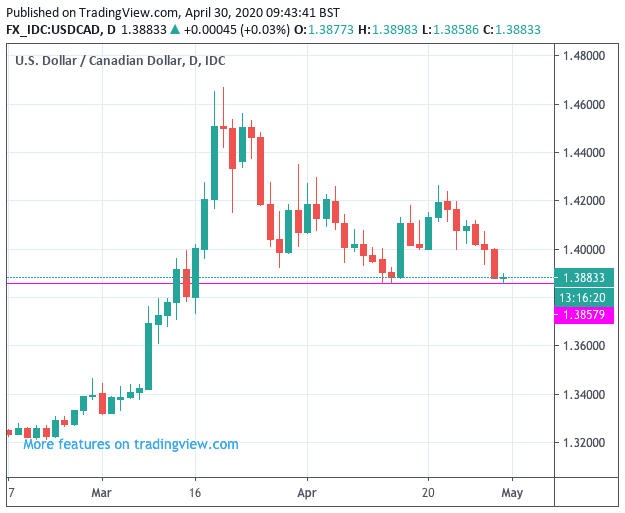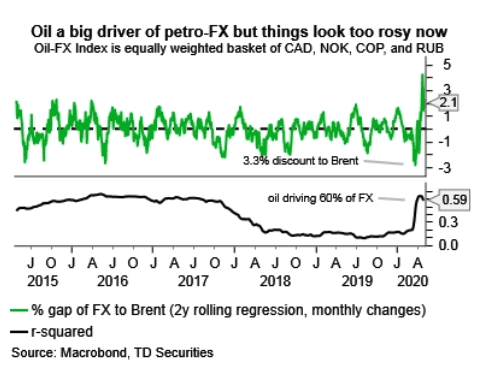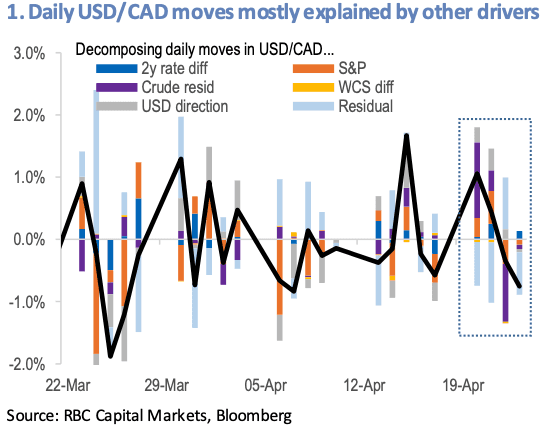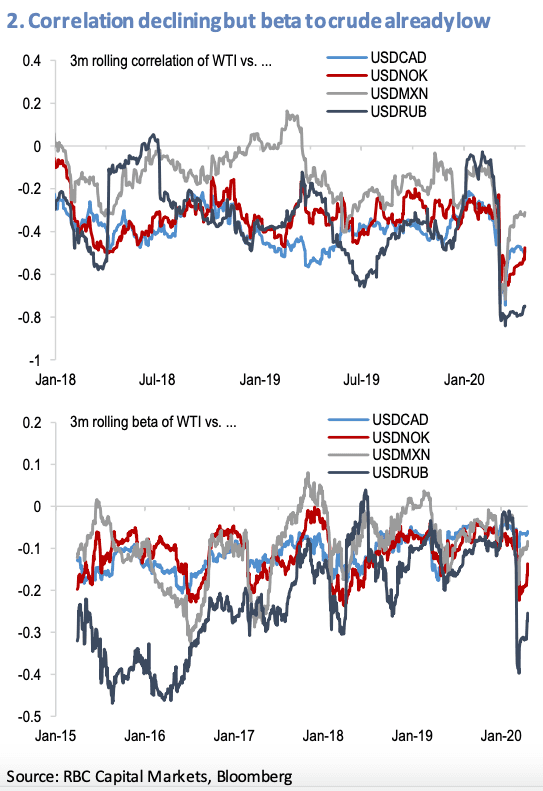The Canadian Dollar can Advance Further Short-term but Questions Asked over Valuation into May
- CAD registers a month of gains
- But could be considered overvalued on some metrics
- "Oil currencies now look stretched" - TD Securities

Image © Adobe Images
- GBP/CAD spot rate at time of writing: 1.7329
- Bank transfer rates (indicative guide): 1.6722-1.6844
- FX specialist rates (indicative guide): 1.6924-1.7173 >> more information
The Canadian Dollar retains a broadly constructive tone on global foreign exchange markets heading into the end of what has been a month of broad appreciation, moving higher alongside its commodity currency peers in response to an ongoing improvement in global investor risk sentiment.
Foreign exchange markets continue to be driven by a binary assessment of the outlook, with currencies such as the Canadian Dollar, Australian Dollar and New Zealand tending to outperform the likes of the Euro, Dollar, Yen and Pound when markets are appreciating.
"The CAD has extended its push higher against the USD modestly through the overnight session, with the CAD lifted alongside the AUD and NZD on the back of investors’ pro-risk mood and, for the CAD specifically, a slight gain in still soft energy prices," says Shaun Osborne, Chief FX Strategist at Scotiabank.
Over the course of April the Canadian currency has appreciated 2.0% against the U.S. Dollar, 1.66% against the Euro and 1.3% against the Pound.
The Pound-to-Canadian Dollar exchange rate has fallen back to 1.7322 on the back of the CAD's appreciation, having earlier on Thursday registered its lowest level since April 08 at 1.7261.
The U.S. Dollar-to-Canadian Dollar exchange rate has now fallen back to 1.3883, and we are sure technical analysts will be watching the charts with interest noting the sizeable support line the market has reached:
A break below ~1.3860 could well open up the door to further Canadian Dollar gains, not just against the U.S. Dollar but other CAD-based pairs that take direction from the headline USD/CAD.
"Risk-taking and crude oil have been heavy influencers for the CAD amid the recent volatility spike around the coronavirus outbreak and those factors clearly remain at play for now," says Osborne.
However, the strategist says while short-term momentum looks constructive, question marks do hang over the Canadian Dollar's ability to appreciate over a longer-term timeframe.
"We think the CAD can regain a bit more ground at least in the short run but a sustained break below the 1.40 area may require more clarity on domestic and international economic normalisation and perhaps even what sort of shape recovery the global economy can expect once reopening is underway."
Indeed, analysis from Canadian investment bank TD Securities suggests the Canadian Dollar is now starting to look overvalued on some metrics.
"Oil currencies now look stretched, increasing vulnerabilities for the likes of CAD," says Mark McCormick, Global Head of FX Strategy at TD Securities.
The above chart drawn up by McCormick looks at a basket of currencies associated with heavily oil-reliant economies; it includes the CAD, NOK, COP, and RUB.
"It shows that this group is trading at a 2.1% premium to the current level of Brent. We also crossed check with the first principal component of the first 12 generic oil contracts. What's vital is that the average price level matters most for oil currencies, but they have started to overshoot the level of the price," says McCormick .
TD Securities maintain a strategic stance that backs further Canadian Dollar weakness against the U.S. Dollar, based on the above view that the Canadian Dollar might be too expensive relative to oil market dynamics.
Regular readers of Pound Sterling Live will have however read our piece out midweek that suggested oil prices are having a waning impact on the value of the Canadian Dollar.
Research from RBC Capital Markets showed that the pull of oil on the Canadian Dollar has been steadily waning over the course of the past ten years.
According to RBC Capital Markets, while it is tempting to just think of the Canadian Dollar as an oil currency, "that relationship has weakened over the last decade and it is not linear".
The findings could go some way in explaining the Canadian Dollar's decidedly robust tone over the course of the past month that has meant only the commodity-linked currencies of Australia and New Zealand have outperformed the Canadian Dollar.
"We have heard a number of people ask why CAD isn’t weaker," says Elsa Lignos, Global Head of FX Strategy at RBC Capital in London. "It partly reflects frustration – long USD/CAD has been a popular trade in spot and options, and given the price action in crude, this could have been the moment to look for an explosive move higher."
"The first obvious point to make is that looking the correlation of CAD to the first (May) WTI contract is misleading when contango reaches the extremes," adds Lignos, referencing the fall of the May WTI contract into negative territory.
RBC Capital's research shows that using the May WTI contract as a proxy for the entire crude market and applying historic elasticities, would suggest USD/CAD should have hit 1.46, with a peak as high as 1.70 when the May contract plunged.
Yet, the April high for USD/CAD was at 1.4265.
"The correlation between USD/CAD and crude has recently declined," says Lignos, "but more notable is the low elasticity or ‘beta’. It is not something specific to CAD, with similar patterns seen in NOK, MXN and RUB, though USD/CAD has the lowest beta overall."
Yet, a stronger Canadian Dollar in the face of the hit being suffered by the country's sizeable energy sector does appear to be case of the currency defying gravity.
Results from the Bank of Canada's (BoC) Spring Business Outlook Survey suggest that business sentiment had softened in most regions even before concerns around COVID‑19 intensified in Canada.
"Confidence deteriorated the most among firms in energy-producing regions," said the BoC. "The sales outlook for businesses tied to the energy sector had weakened significantly because of falling oil prices."
Many of the businesses reporting back to the BoC said that low oil prices were leading to financing and liquidity issues and were forcing them to reduce costs and operations.
The majority of firms said the current oil price shock as worse than the episodes of significant oil price declines in 2008 or 2015.
"So, watch out for a delayed impact on CAD, which may depreciate faster if risk appetite takes another hit or trail other pro-cyclical currencies if good Covid-related news helps sentiment," says Chris Turner, Global Head of Markets and Regional Head of Research for UK & CEE at ING Bank N.V.








